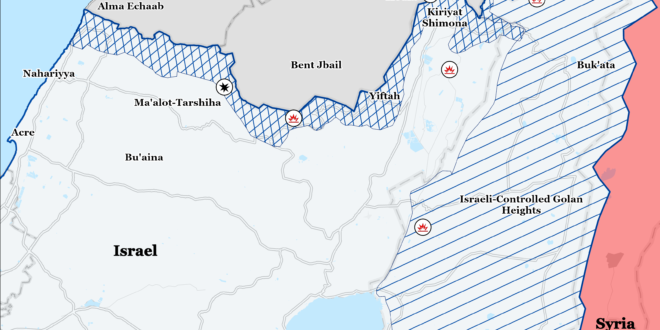Hamas sent a formal response to the Israeli ceasefire proposal to international mediators on June 11. Hamas and the Palestinian Islamic Jihad expressed “readiness to positively” engage in a deal, emphasizing Hamas’ primary demand for a permanent ceasefire.[i] Hamas Political Bureau Chairman Ismail Haniyeh and Palestinian Islamic Jihad Secretary General Ziad al Nakhalah gave the response to the Qatari prime minister.[ii] Qatar and Egypt confirmed receipt of the Hamas response and said that they will review it and coordinate next steps.[iii] Hamas Political Bureau member Osama Hamdan told Lebanese Hezbollah-affiliated media that Hamas left comments on the latest ceasefire proposal. The comments include descriptions of the ceasefire and demands for Israeli withdrawals from the Rafah crossing and Philadelphi Corridor.[iv] Hamdan added that all Palestinian factions share Hamas’ position. Hamas has been reviewing an Israeli-accepted, US-drafted proposal since May 30.[v] Several Hamas officials have indicated opposition to the Israeli ceasefire proposal, arguing that Hamas will only accept a proposal that guarantees a permanent ceasefire. A permanent ceasefire is one of the maximalist demands that Hamas has maintained since December 2023.[vi]
The United Nations Security Council (UNSC) adopted a resolution on June 10 that called on Hamas to accept the latest ceasefire proposal.[vii] The United States presented the resolution as part of several other diplomatic efforts to increase international pressure on Hamas to accept the proposal.[viii] The resolution detailed the three phases of the ceasefire proposal and stressed that a ceasefire would continue even after the initial 42-day period of the first phase if negotiations for phase two are ongoing.[ix] Hamas has expressed concern that the proposal does not ensure a permanent end to hostilities.[x] A senior Hamas official told Reuters on June 11 that it accepts the UNSC resolution and is ready to negotiate over the details.[xi] US Secretary of State Antony Blinken said Hamas’ response is “hopeful,” but noted that Hamas’ leadership in the Gaza Strip will be the one to make final decisions.[xii]
Hamas leader in the Gaza Strip Yahya Sinwar remains confident in Hamas’ position in the Gaza Strip and believes that Israel has “more to lose” than Hamas. Sinwar recently told mediators that, “[Hamas] has the Israelis exactly where [Hamas] wants them.”[xiii] Sinwar believes that Israel has more to lose from the war than Hamas does, and that Hamas can continue the fight in the Gaza Strip.[xiv] Sinwar’s confidence is reflected in Hamas’ insistence on its maximalist demands during negotiations since December 2023. Hamas likely remains confident that it will survive Israeli military operations in the Gaza Strip and can therefore maintain its maximalist demands without granting major concessions.
Sinwar recently told unspecified allies that the current war is similar to the Battle of Karbala in 680 CE.[xv] Imam Hussein, the third Shia imam, led a small band of fighters against the massive army of the Umayyad Caliph Yazid in the battle and ultimately sacrificed himself and his men to defend true Islam.[xvi] Iran and the broader Axis of Resistance commonly reference the Battle of Karbala in military doctrine related to challenging ”oppressors.”[xvii] The story of Hussein is a very significant event in Islamic history, and Sinwar’s reference to it is not unusual. Sinwar is analogizing himself and his fighters to Hussein and his followers.
US Secretary of State Antony Blinken met with several regional leaders in the Middle East on June 10 and June 11 to discuss the need to secure a ceasefire in the Gaza Strip.[xviii] Blinken met with Israeli Prime Minister Benjamin Netanyahu and other senior Israeli officials in Israel on June 10 in a series of separate meetings.[xix] Blinken said that there is “strong consensus” in Israel and internationally to move forward with the proposal and “everyone’s vote is in, except one vote and that’s Hamas.”[xx] Blinken said that “it really is down to one person at this point,” referring to Sinwar.[xxi]
Iranian reformist presidential candidate Masoud Pezeshkian is trying to balance his relatively moderate agenda with his need to maintain the approval of the Iranian supreme leader. Pezeshkian emphasized the Iranian president’s subordination to the supreme leader in his first televised interview on June 10, stating that “the general policies of the supreme leader are clear, and any administration that governs must implement [these general policies].”[xxii] Pezeshkian made these comments in the context of implementing Iran’s next five-year development plan. Iran’s five-year development plan is a document that outlines Iran’s budget and development policies throughout a five-year period. Pezeshkian separately promoted reformist ideas in an interview with a reformist newspaper on June 11, illustrating the precariousness with which Pezeshkian must balance his subordination to the supreme leader and his reformist agenda.[xxiii] Pezeshkian defended Iranians’ right to protest, noting that “all protests stem from injustice. . . you can’t take the rights of an individual away and tell them to be quiet” and advocated for a less aggressive veiling enforcement policy. Pezeshkian’s June 10 comments stressing the supreme leader’s role in setting Iran’s policies are not uncharacteristic of a reformist candidate.
Most—if not all—actors in the Iranian political spectrum are ultimately dedicated to preserving the Islamic Republic and serving its supreme leader. Pezeshkian likely seeks to generate support by discussing popular reforms supported by Iranian youth, including economic engagement with the West and mandatory veiling. Pezeshkian—and any other reformist—must work within the system to implement reforms, all of which would need to be approved by the supreme leader. This means that the reformist camp works from an inherent disadvantage because reforms promised by a presidential candidate will not be implemented unless the reforms have the supreme leader’s approval, and he is less likely to grant to reformist policies. Hardliners do not have the same restrictions because their policies are more likely to be green lit by the supreme leader.
Voter participation in Iranian presidential elections have significantly decreased in recent years due to decreased political representation and election engineering.[xxiv] It is unclear if Pezeshkian, the sole reformist candidate, will instill greater confidence in the integrity of the regime’s electoral system and improve voter turnout. The Guardian Council—the regime entity responsible for vetting and approving presidential candidates—boasted on June 11 that the “unpredictable” list of approved candidates demonstrated the equity with which candidates were reviewed.[xxv] The council heavily engineered the 2021 presidential elections to favor former President Ebrahim Raisi.[xxvi] It is unlikely that Pezeshkian’s participation in the 2024 elections will repair the damage done by the 2021 election engineering or improve voters’ trust and subsequent participation in the process.
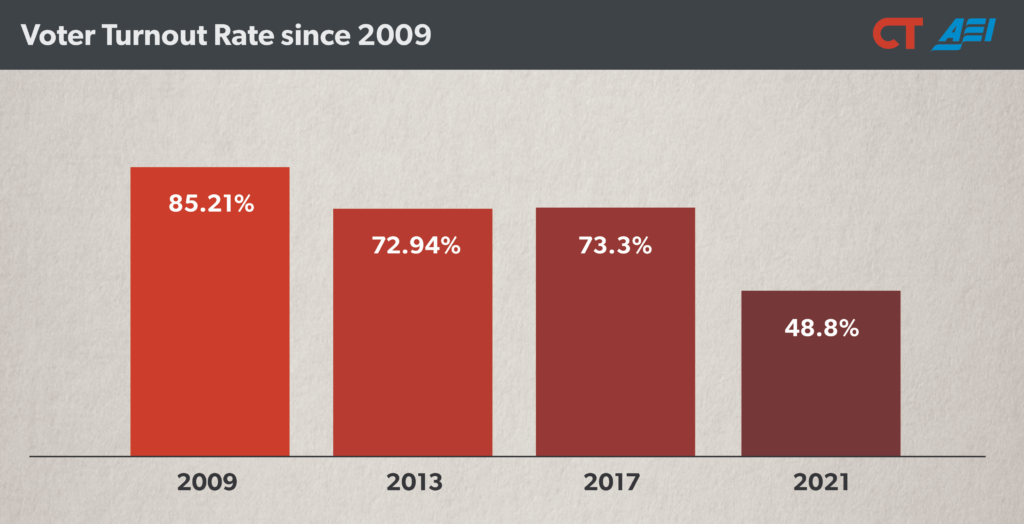
Source: Syracuse University Iran Data Portal, 2009-2021 presidential election voter turnout rates
Presidential candidates are measuring their campaigns against the former Raisi administration. Hardline presidential candidate and Parliament Speaker Mohammad Bagher Ghalibaf stressed in an interview on June 10 that he would retain Raisi administration officials if he were to win the presidency.[xxvii] Pezeshkian conversely criticized the Raisi administration’s economic policy on June 11.[xxviii]
UK-based outlet Amwaj Media reported that multiple regime officials worked to disqualify prominent moderate Iranian politician Ali Larijani from the 2021 presidential elections.[xxix] A June 10 Amwaj Media report cited an Iranian hardline source who said that former Islamic Revolutionary Guards Corps (IRGC) Intelligence Organization Chief Hossein Taeb spearheaded efforts to disqualify Larijani in 2021.[xxx] Taeb maintains close ties to Supreme Leader Ali Khamenei’s son, Mojtaba Khamenei.[xxxi] The hardline source told Amwaj Media that unspecified individuals “forced” Larijani’s personal doctor to testify to the Guardian Council that Larijani was physically unfit to be president.[xxxii] Former Law Enforcement Commander Brigadier General Hossein Ashtari separately accused Larijani of nepotism.[xxxiii] These claims and accusations led the Guardian Council to disqualify Larijani in 2021.
A second unspecified Iranian source said that Larijani asked Khamenei before registering for the June 2024 presidential election to investigate the validity of his 2021 disqualification, according to Amwaj. Larijani did not specifically ask Khamenei for a “green light” to enter the election, however.[xxxiv] Khamenei charged Judiciary Chief Gholam Hossein Mohseni Ejei with investigating Larijani’s disqualification and Ejei exonerated Larijani from the accusations that individuals such as Ashtari had brought up against Larijani in 2021.[xxxv] Larijani’s exoneration reportedly led him to believe that the Guardian Council would allow him to compete in the June 28 election.[xxxvi] Seven of the 12 Guardian Council members voted against Larijani, however, thus barring him from running in the election.[xxxvii] An informed source told Amwaj Media that the Guardian Council disqualified Larijani because he is not “prudent” and lacks “certain managerial qualities.”[xxxviii] A senior Shia cleric in Qom who spoke to Amwaj Media added that supreme leader succession played an important role in the Guardian Council’s decision to disqualify Larijani.[xxxix] The cleric assessed that Ali Larijani’s presidency could have increased the chances of his brother, Expediency Discernment Council head Sadegh Amoli Larijani, to succeed Khamenei as Iran’s next supreme leader.[xl]
Iranian-backed Iraqi militia Faylaq al Waad al Sadiq claimed on June 11 that unidentified actors conducted a rocket attack targeting US forces in al Shaddadi, Hasakah Province, Syria.[xli] CTP-ISW cannot verify whether any attack occurred. Faylaq al Waad al Sadiq reportedly has ties to Iranian-backed Iraqi militias Asaib Ahl al Haq and Harakat Hezbollah al Nujaba.[xlii] Faylaq al Waad al Sadiq similarly claimed in late March 2024 that unidentified actors conducted a drone attack targeting US forces at Conoco Mission Support Site in eastern Syria.[xliii] The United States did not confirm the March 2024 attack.
Key Takeaways:
- Gaza Strip Ceasefire: Hamas sent a formal response to the Israeli ceasefire proposal to international mediators on June 11, but the full response has not yet been released. A senior Hamas member told Hezbollah-affiliated media that Hamas left comments on the proposal including descriptions of the ceasefire and demands for Israeli withdrawals from the Rafah crossing and Philadelphi Corridor.
- Hamas Ceasefire Calculations: Hamas leader in the Gaza Strip Yahya Sinwar remains confident in Hamas’ position in the Gaza Strip and believes that Israel has “more to lose” than Hamas. Sinwar analogized himself to Imam Hussein in a statement to unspecified allies. Hussein was a major figure in Islamic history who fought and died against a much larger army at Karbala in 680 CE.
- Iranian Presidential Elections: Iranian reformist presidential candidate Masoud Pezeshkian is trying to balance his relatively moderate agenda with his need to maintain the approval of the Iranian supreme leader. Most—if not all—actors in the Iranian political spectrum are ultimately dedicated to preserving the Islamic Republic and serving its supreme leader.
- Iranian Presidential Disqualifications: UK-based outlet Amwaj Media reported that multiple regime officials worked to disqualify prominent moderate Iranian politician Ali Larijani from the 2021 presidential elections.
- Iraq and Syria: An Iranian-backed Iraqi militia claimed that unidentified fighters fired rockets at US forces in northeastern Syria on June 11. This group previously claimed that unidentified fighters targeted US forces in northeastern Syria in March 2024, but CENTCOM did not confirm that attack. There is no evidence that either the June 11 or March 2024 attacks actually occurred.
- Yemen: CNN reported on June 11 that US intelligence learned that Houthis are in talks to provide weapons to Somalia-based Sunni militant group al Shabaab, citing three anonymous US officials.
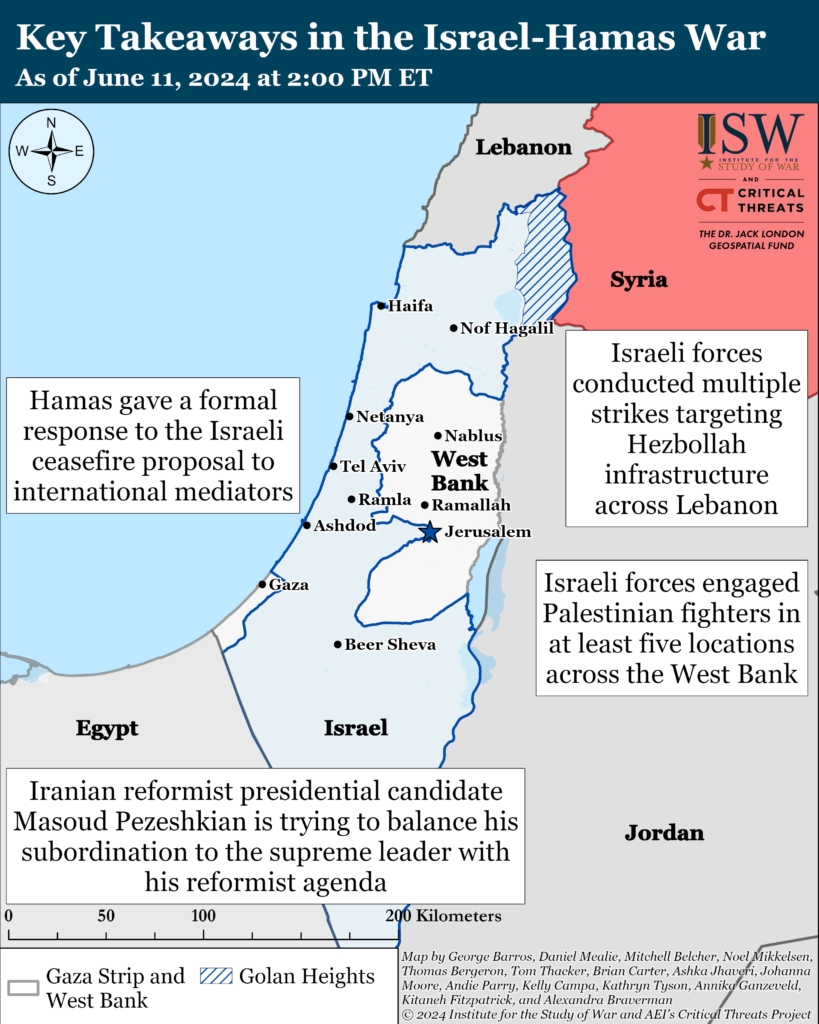
Gaza Strip
Axis of Resistance objectives:
Erode the will of the Israeli political establishment and public to sustain clearing operations in the Gaza Strip
Reestablish Hamas as the governing authority in the Gaza Strip
The IDF continued to operate along the Netzarim Corridor south of Gaza City on June 11.[xliv] The IDF Air Force struck a Palestinian cell that posed a threat to ground forces in the area. A PIJ fighter fired a sniper rifle targeting an IDF soldier along the corridor.[xlv]
The IDF said on June 11 that the 98th Division withdrew from Gaza Strip’s Central Governorate.[xlvi] The IDF launched raids with two brigades targeting eastern Deir al Balah and eastern Bureij on June 4.[xlvii] An Israeli Army Correspondent reported that the raids ”provided cover” for the Israeli hostage rescue operation in Nuseirat on June 8.[xlviii] Israeli forces in the Central Governorate killed about 100 Palestinian fighters and destroyed several kilometers of tunnels there, including one near the border with Israel in eastern Bureij.[xlix]
The IDF continued clearing operations in Rafah on June 11. The IDF Givati Brigade engaged Palestinian fighter cells in the area.[l] Three Palestinian militias claimed attacks targeting Israeli forces in Rafah.[li] The IDF confirmed on June 11 that Palestinian fighters detonated a house-borne improvised explosive device (HBIED) killing four soldiers in the Givati Brigade in eastern Rafah.[lii] The IDF said its forces entered a house believed to be free of explosives when the house exploded and collapsed onto them. The IDF discovered a tunnel in the building, which was the home of a Hamas operative. Hamas fighters claimed the HBIED attack on June 10.[liii]
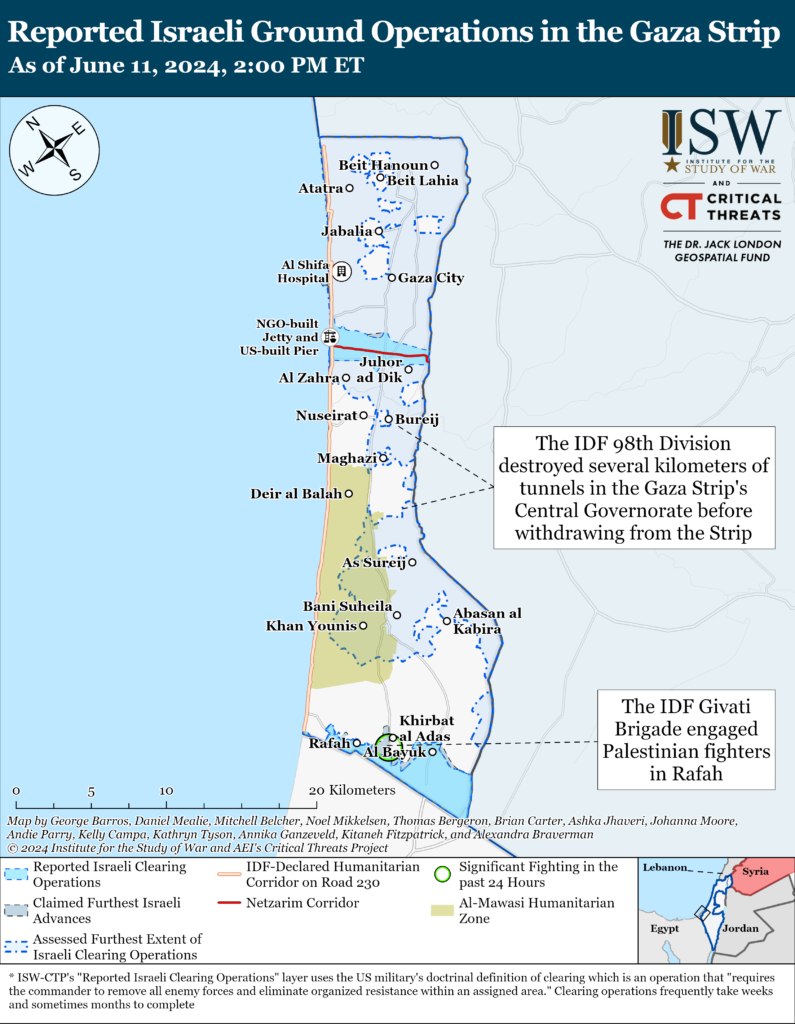
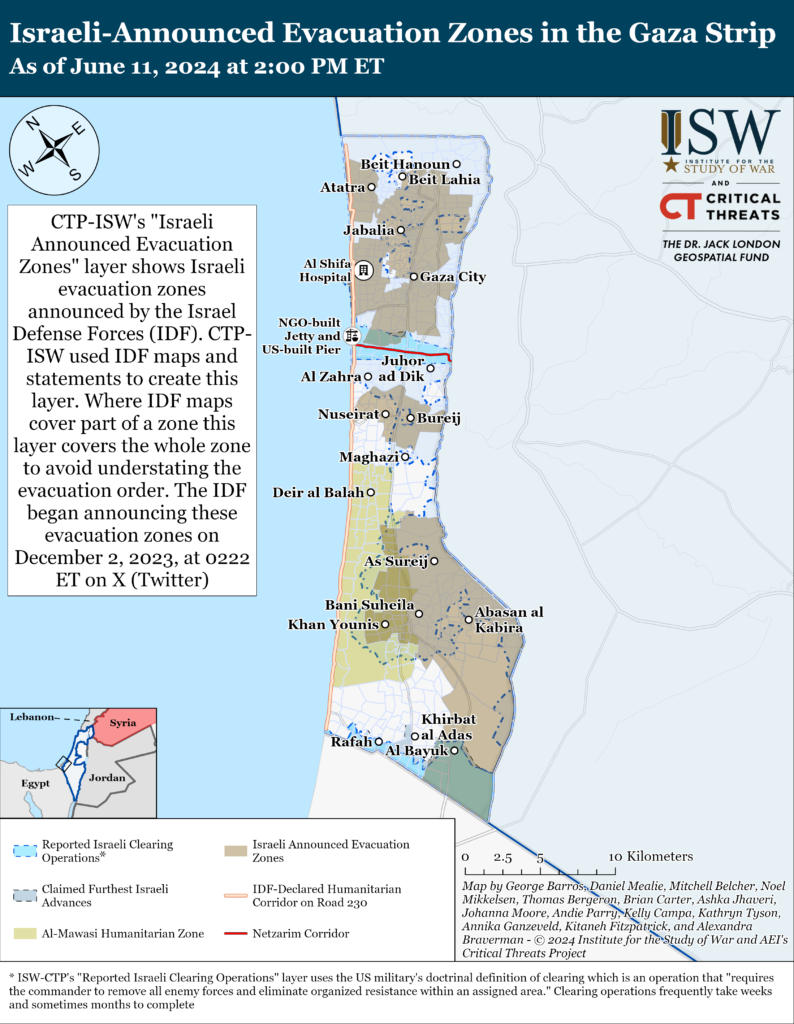
US Central Command commander Gen. Michael Kurilla met with IDF Chief of Staff Lt. Gen. Herzi Halevi in Israel.[liv] The commanders discussed Iran, the northern Israeli border, and war in the Gaza Strip.
Palestinian fighters conducted one indirect fire attack from the Gaza Strip into Israel on June 11. PIJ fighters fired a rocket salvo targeting an IDF site near Kissufim in southern Israel.[lv]
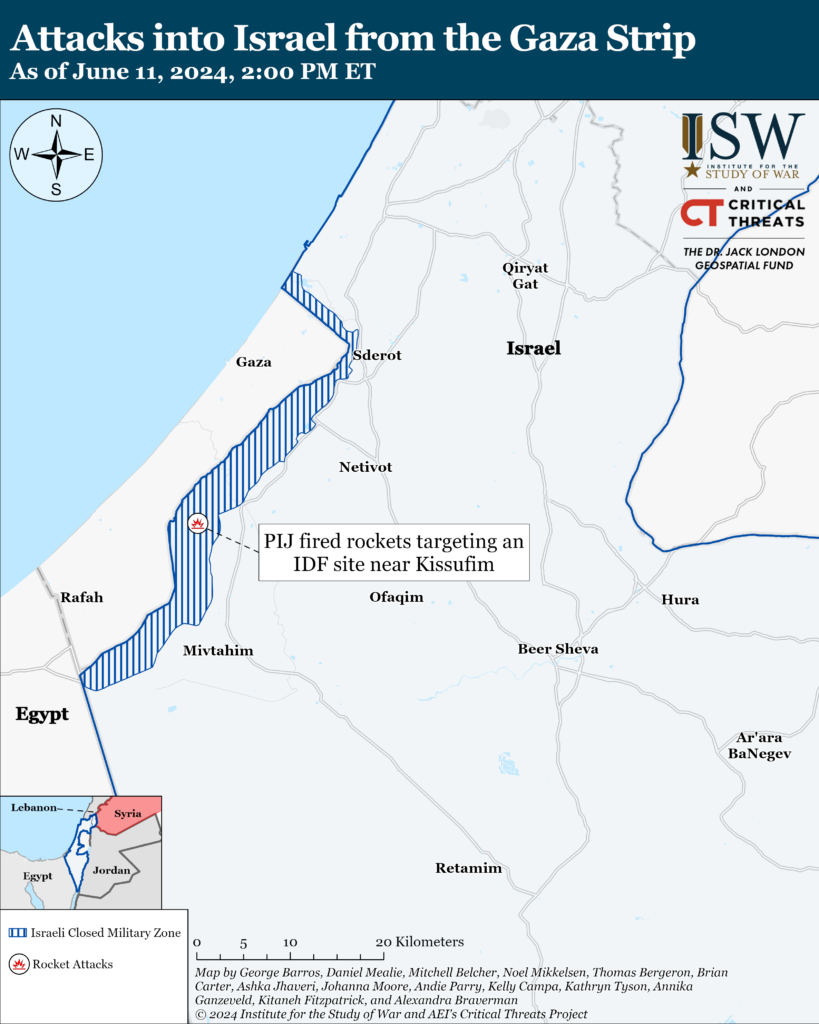
Recorded reports of attacks; CTP-ISW cannot independently verify impact.
West Bank
Axis of Resistance objectives:
Establish the West Bank as a viable front against Israel
Israeli forces have engaged Palestinian fighters in at least five locations across the West Bank since CTP-ISW’s last data cut off on June 10.[lvi] Israeli forces located and destroyed an explosives production facility and engaged Palestinian fighters during an 18-hour raid in al Farah refugee camp, north of the Jordan Valley.[lvii] Israeli forces destroyed 80 explosive charges and pipe bombs during the operation.[lviii] An IDF helicopter killed four Palestinians who were engaging Israeli forces as the IDF entered Kfar Dan, according to Israeli media.[lix] Israeli forces conducted a raid in Kfar Nima on June 10 targeting Palestinian fighters who conducted an arson attack on an Israeli settler farm in Sde Efraim on June 9.[lx] Hamas mourned four fighters who died during fighting with Israeli forces in Kfar Nima.[lxi]
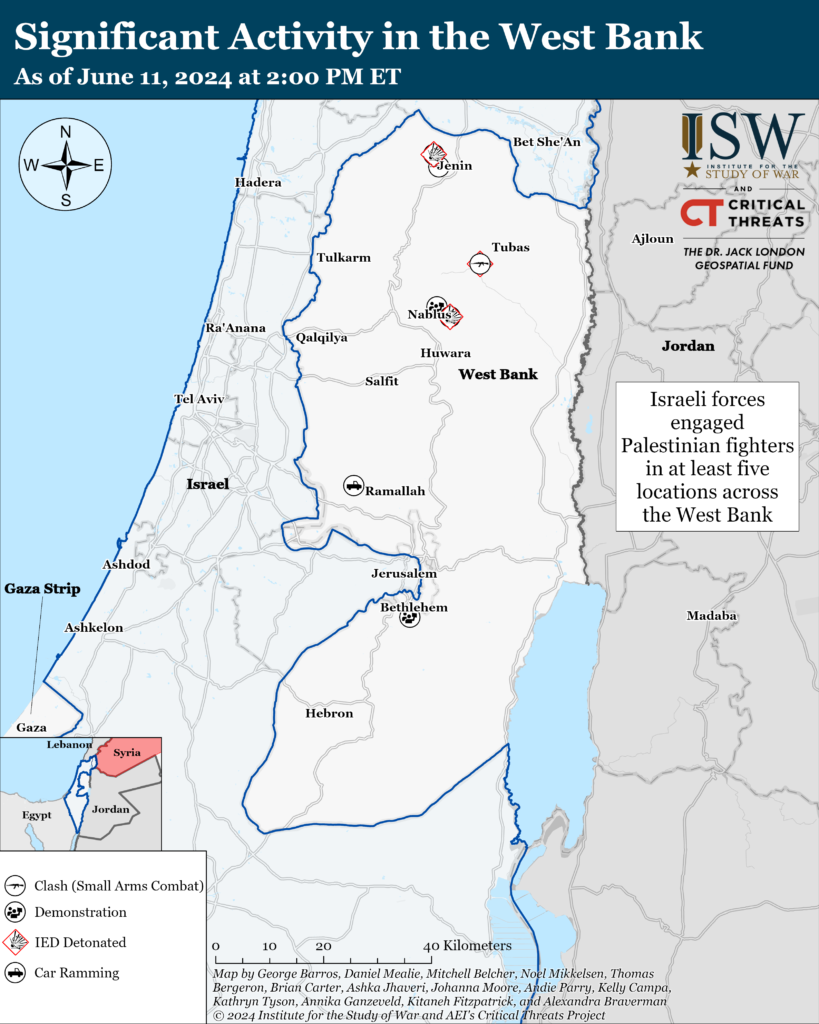
This map is not an exhaustive depiction of clashes and demonstrations in the West Bank.
Southern Lebanon and Golan Heights
Axis of Resistance objectives:
Deter Israel from conducting a ground operation into Lebanon
Prepare for an expanded and protracted conflict with Israel in the near term
Expel the United States from Syria
Israeli forces conducted multiple strikes targeting Hezbollah infrastructure across Lebanon after Hezbollah shot down an IDF drone on June 10.[lxii] The Israeli Air Force (IAF) struck two unspecified targets at a Hezbollah Unit 4400 compound in the Beqaa Valley overnight.[lxiii] Hezbollah’s Unit 4400 is responsible for transferring weapons from Iran to Hezbollah according to Israeli media.[lxiv] The IAF also struck an unspecified Hezbollah “military site” and two “military buildings” in Aitaroun, southern Lebanon.
Syrian media reported the IDF also struck a truck repair garage and warehouse in Hawsh al Sayyid Ali, al Qusayr District, Homs Province, Syria, on June 11.[lxv] A Syrian journalist reported that the IDF struck a weapons shipment being transported from Syria to Lebanon on June 11.[lxvi] Hawsh al Sayyid Ali is along a main Hezbollah supply route from Syria into Lebanon.[lxvii]
Lebanese Hezbollah has conducted at least eight attacks into northern Israel since CTP-ISW’s last data cutoff on June 10.[lxviii] Hezbollah launched about 50 Katyusha rockets from southern Lebanon into the Golan Heights on June 10 in retaliation for the IDF airstrikes on Hezbollah sites in the Beqaa Valley .[lxix] The IDF intercepted ”several” of the rockets and the remaining rockets landed in open areas.[lxx] The IDF intercepted one Hezbollah drone launched from Hezbollah into the western Galilee on June 11.[lxxi]
Hezbollah mourned the death of three fighters on June 11 but did not state their cause of death.[lxxii]
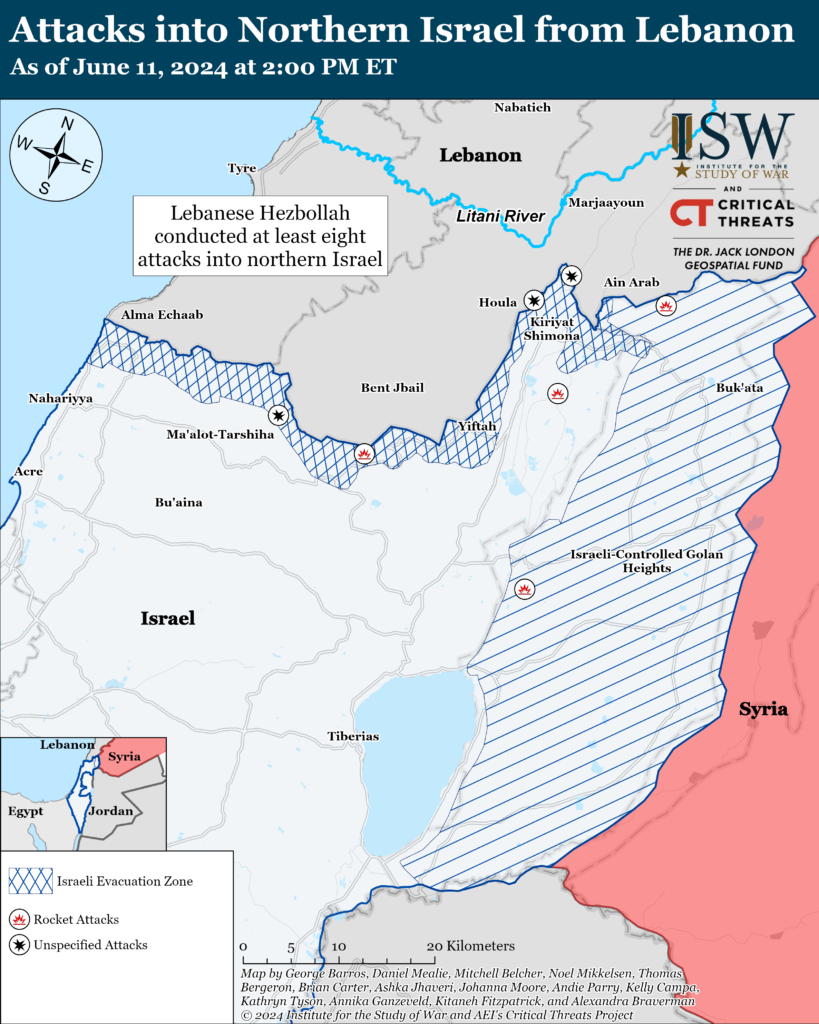
Recorded reports of attacks; CTP-ISW cannot independently verify impact.
Iran and Axis of Resistance
Iranian media attributed reported delays in long-term Russo-Iranian cooperation to the upcoming Iranian presidential election.[lxxiii] Russian Special Presidential Envoy Zamir Kabulov told Russian state news agency RIA Novosti on June 11 that Russia and Iran had temporarily suspended working on a bilateral agreement due to unspecified issues raised by Iran.[lxxiv]
The Islamic Resistance in Iraq—a coalition of Iranian-backed Iraqi militias—has claimed three drone attacks targeting Israel since CTP-ISW’s last data cutoff on June 10. The Islamic Resistance in Iraq claimed that it conducted drone attacks targeting an unspecified “military target” in the Golan Heights, an unspecified “vital target” in Eilat, and an unspecified “vital target” at the Haifa Port.[lxxv] The IDF intercepted an unspecified projectile over Haifa on June 11.[lxxvi] The Israeli Air Force separately intercepted a suspicious aerial object that approached Israeli airspace from the east overnight on June 10 and 11.[lxxvii] The object did not cross into Israeli airspace.[lxxviii]
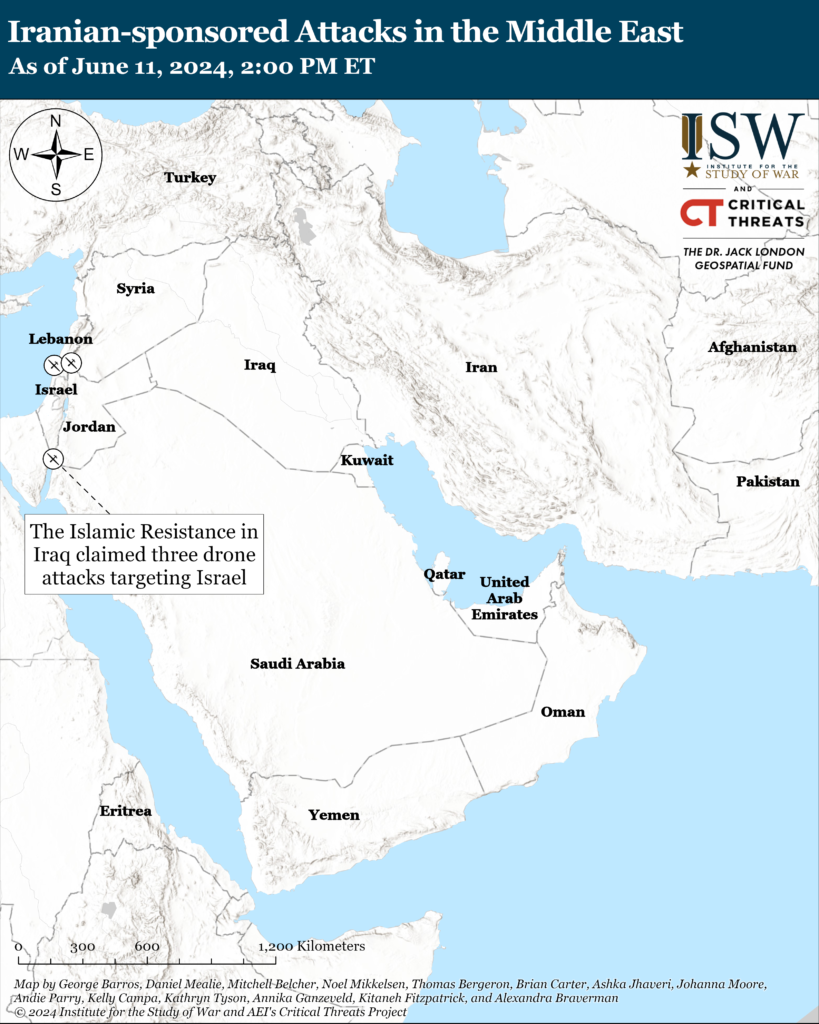
CNN reported on June 11 that US intelligence learned that Houthis are in talks to provide weapons to Somalia-based Sunni militant group al Shabaab, citing three anonymous US officials.[lxxix] A senior Biden administration official said that the United States has warned other states in the region about this possible agreement in recent weeks. One of the officials indicated that the Houthis would send a “bigger kit” of weaponry than rockets and mortars. The Gulf of Aden is a long-time weapons trafficking corridor between Yemen and the Horn of Africa.[lxxx] Al Shabaab has access to rockets and mortars from this and other smuggling networks, and it would probably look to the Houthis for more advanced systems such as surface-to-air missiles or low-end attack drones. The US officials said that the United States has not yet found evidence of the delivery of Houthi weapons to Somalia. Officials also noted that United States does not have ”direct evidence“ that Iran is involved in the cooperation. CTP will publish further analysis on this report in this week’s CTP Africa File, which you can find here.
The US Treasury Department’s Office of Foreign Assets Control (OFAC) sanctioned four individuals, four entities, and two vessels for facilitating commodity shipments and financial transactions for the Houthis and the IRGC Quds Force on June 10.[lxxxi] This is the seventh round of sanctions targeting the Iran-based, IRGC-backed Houthi financier Said al Jamal’s network of front companies and vessels since October 2023. The US Treasury Department previously sanctioned Said al Jamal in June 2021.[lxxxii]
OFAC sanctioned the following entities and individuals connected to the Said al Jamal network:[lxxxiii]
UAE- and Oman-based Shark International Shipping LLC and its managing director, John Britto Aruldas
India-based Rayyan Shipping (OPC) Private Limited
India-based Vivek Ashok Pandey, captain of sanctioned vessel Olympics
Yemen-based money launderer Abdallah Najib Ahmad al Jamal, Said al Jamal’s nephew
OFAC sanctioned the following commercial vessels, entities, and individuals that support, enable, or contribute to Iran or the IRGC-QF monetarily or militarily:
- Hong Kong-based Lainey Shipping Limited
- Panama-flagged oil tanker Janet
- Panama-based Louis Marine Shipholding Enterprises SA
- Panama-flagged oil tanker Bella 1
- India-based vessel master Sandeep Singh Choudhary
US Central Command (CENTCOM) intercepted a Houthi one-way attack drone over the Gulf of Aden on June 10.[lxxxiv] CENTCOM assessed that the drone posed a threat to U.S., coalition forces, and merchant vessels.
 Eurasia Press & News
Eurasia Press & News
